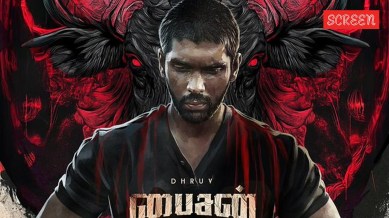Click here to follow Screen Digital on YouTube and stay updated with the latest from the world of cinema.

Bison is a Mari Selvaraj film with an aching heart and an angry mind. True to the auteur’s previous works, it shines a light on the plight of oppressed castes and how the everyday privileges of the upper strata are, in reality, hard-won battles for those from marginalized communities. The film follows Kitaan (Dhruv Vikram), a quietly ferocious young man who has dedicated his life to kabaddi. Yet, circumstances force him to set aside his passion, as his father often reminds him and others, “It is not the same for us,” a line that encapsulates the deep-seated caste barriers that stifle both individual and collective progress.
Compared to Vaazhai, Mari Selvaraj’s more personal, grounded work drawn from his own childhood, Bison is a more conventional outing. It is also his most linear and crowd-friendly film in years, balancing familiar storytelling with piercing social commentary. Even within this accessible framework, Mari fills every crevice with the haunting, brutal detail that has come to define his cinema.
Like Karnan, Bison examines a community on the brink of collapse, torn apart by long-held caste biases and power structures that exploit the marginalized for political gain. The violence and anguish endured by its characters make Bison one of Mari Selvaraj’s most rage-filled works to date.
Also Read | Dude movie review: Pradeep Ranganathan and Mamitha Baiju save this uneven entertainer
Mari’s trademark visual showmanship is more restrained here than in his earlier films, yet it remains unmistakable. Kitaan’s struggle to move forward in a relentlessly cruel world is visualized through recurring shots of Dhruv Vikram running, each time someone or something obstructs his path, symbolizing how society keeps holding him back. The recurring ‘Bison’ head imagery reinforces the film’s central metaphor of strength, rage, and survival. Among its most striking moments is a visceral sequence where a minor scuffle spirals into the senseless butchering of a goat meant for a ritual, an image that captures both the casual brutality and the festering hatred within the community. This unflinching portrayal of violence marks bold new territory for Mari Selvaraj.
The film sustains a constant tension, of people taking offense at the slightest provocations, and uses it as a vital narrative thread to frame the hero’s dilemma. Dhruv Vikram is remarkably understated as Kitaan, a young man torn between familial love and the hostility of those who despise him without cause. As the walls close in, he channels quiet defiance, his physicality expressing the awkwardness and burden of a boy trapped in cycles of oppression that predate him. Dhruv captures, with haunting precision, the suffocating despair and internal turmoil that define Kitaan’s journey.
Pashupathi once again delivers a standout performance, and his dynamic with Dhruv Vikram forms the film’s emotional core. Lal and Ameer Sultan are equally compelling as rival political power brokers who ultimately reveal themselves to be mere figureheads, pawns in the self-perpetuating machinery of hate politics that has divided communities for generations. Mari Selvaraj lends rare humanity to these men, portraying them as flawed, deluded figures consumed by their own influence and followed by crowds driven not by reason but by intolerance.
Rajisha Vijayan is quietly powerful as Kitaan’s anxious sister, a woman haunted by her past but devoted to seeing her brother achieve greatness in kabaddi. Anupama Parameswaran makes a strong impression in her brief appearance as Kitaan’s conflicted love interest. Nivas K. Prasanna’s music is seamlessly woven into the narrative; even when used as inner monologues, the songs never feel misplaced. Ezhil Arasu’s warm, expressive cinematography helps delineate timelines with clarity, while Mari Selvaraj’s intercutting between scenes gives the film a rhythmic pulse. The transitions between timelines merge far more seamlessly than in Maamannan, where tonal shifts were more jarring. The use of black-and-white for the present and color for the past is an inspired visual choice that grounds the film’s emotional architecture.
Also Read | Pathirathri movie review: Navya Nair and Soubin Shahir deliver a generic crime drama
Bison is a quintessential Mari Selvaraj film, albeit one slightly softened for the masses. Here, the filmmaker seeks to bridge his distinct political voice with his growing interest in accessible storytelling. Yet, Bison stands tall among his works, a fierce, deeply felt story powered by a career-defining performance from Dhruv Vikram.
Bison movie cast: Dhruv Vikram, Rajisha Vijayan, Anupama Parameswaran, Pashupathi, Lal, Ameer Sulthan
Bison movie director: Mari Selvaraj
Bison movie rating: 3.5 stars
Click here to follow Screen Digital on YouTube and stay updated with the latest from the world of cinema.